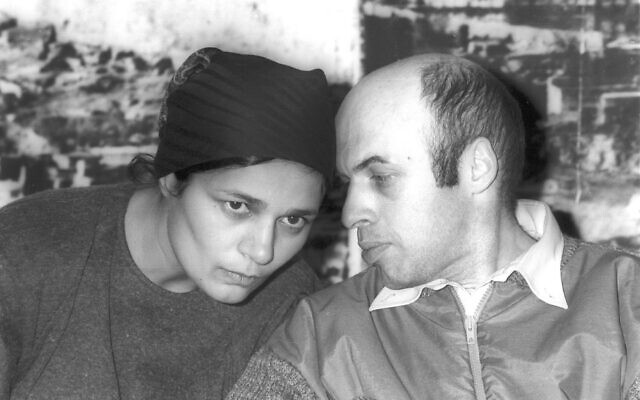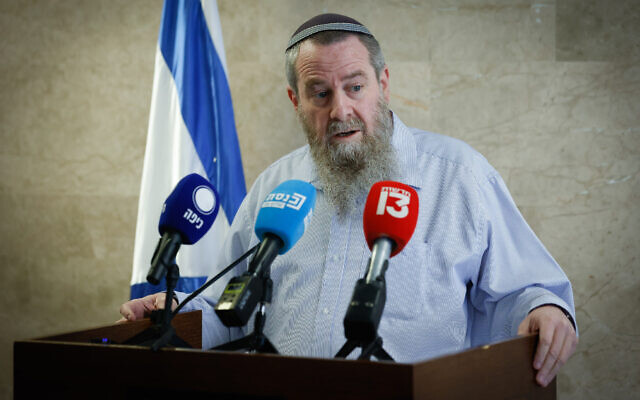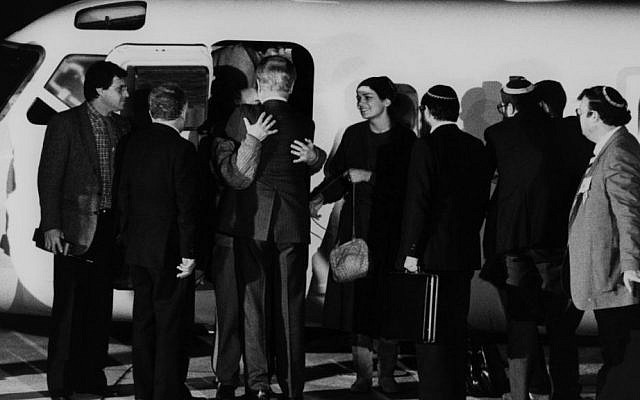Avi Maoz, now the head of the one-MK Noam party, first made a name for himself in the fight to secure the release of Natan Sharansky from Soviet prison in the 1980s.
Working closely with Sharansky’s wife, Avital, Maoz flew around the world and corresponded with international leaders to convince them to press Moscow to allow Soviet Jewry to emigrate as part of the “Let my people go” movement.
He remained close with the Sharansky family after Natan was permitted to immigrate to Israel in 1986 — acting as a spokesman and general righthand man — and stayed by his side for the next 15 years, serving as his deputy-general in the interior and construction ministries during Sharansky’s time in politics with the center-right Yisrael BaAliyah party.
But the man who fought so hard for immigration to Israel from the former Soviet Union will soon be able to slow it to a crawl and turn the already difficult process of proving eligibility under Israel’s Law of Return even more torturous.
Maoz has come out strongly against the Law of Return, which offers automatic citizenship to anyone with at least one Jewish grandparent, provided that they don’t practice another religion. Last month, for instance, Maoz falsely claimed in an article for the right-wing, religious Israel National News website that “hundreds of thousands of non-Jews are immigrating to Israel.” (The true number is at most a few thousand each year, according to Central Bureau of Statistics data. Thus far in 2022, less than 100,000 people immigrated to Israel, and that is a 30-year record high.)
Get The Times of Israel's Daily Edition by email and never miss our top stories
On Sunday, Maoz, whose Noam party broke off from Religious Zionism after uniting with it during the election campaign, signed a coalition agreement with Prime Minister-Designate Benjamin Netanyahu under which he will become a deputy minister in the Prime Minister’s Office with control over Nativ, a government program that is responsible for facilitating immigration from the former Soviet Union.

Natan and Avital Sharansky in 1986 (Courtesy Israel Simionski)
The Prime Minister’s Office’s Nativ — not to be confused with the conversion-to-Judaism program for IDF soldiers that is also called Nativ — is responsible for assessing whether or not an applicant is eligible for Israeli citizenship under the Law of Return.
This can be a complicated process for people from the former Soviet Union, due to decades of poor record-keeping and the breakdown of the formal Jewish communities in those countries under Soviet rule.
With control over that office, Maoz could make the process of proving their eligibility for citizenship far more cumbersome than it already is and impose a higher barrier to entry that would keep some applicants out when there is ambiguity or uncertainty.
(He would not, however, be able to unilaterally change the Law of Return in order to bar the non-Jewish children and grandchildren of Jews from immigrating. And the Likud party has reportedly signaled its opposition to revoking the so-called grandchild clause as demanded by the Haredi and Religious Zionism parties, its presumed coalition partners.)
Maoz hinted at just such a plan of relying on stricter enforcement of the existing rules during the start of his one-man faction meeting on Monday.
“Entering Israel is according to law. We will act according to the law. All Jews are able to immigrate,” Maoz said. But, he added, “we will make sure that people who according to the law aren’t permitted to immigrate [don’t].”

Noam’s sole MK Avi Maoz speaks during his party’s faction meeting at the Knesset, November 28, 2022. (Olivier Fitoussi/Flash90)
At the meeting, Maoz noted his connection to Soviet immigration to Israel, saying he was “coming full circle” by taking control of Nativ.
This has prompted dire warnings from Russian-speaking activists and politicians in Israel.
“They could have just closed up [the Nativ] shop and been done with it,” lamented Russia analyst Ksenia Svetlova, a former politician.
Avigdor Liberman, the head of the right-wing, secular Yisrael Beytenu party, which largely represents Russian-speaking Israelis, similarly warned that Maoz would limit immigration from the former Soviet Union.
“This is an obstacle on the road to immigration for all who come from the former Soviet Union,” said Liberman, who immigrated to Israel from Soviet Moldova, at the start of his faction meeting on Monday.
Nativ has gone through many iterations over the years, initially acting as a clandestine organization to connect Israel to Soviet Zionist leaders and Jewish communities. In addition to verifying immigration eligibility, Nativ today also runs cultural and educational programs in former Soviet Union countries.

Former Soviet Prisoner of Zion Natan Sharansky embraces prime minister Shimon Peres after his release from prison in the Soviet Union on arrival in Israel, on February 11, 1986. To their right is Sharansky’s wife Avital. (Moshe Shai/FLASH90)
Its activities have picked up considerably in Russia and Ukraine following the former’s invasion of the latter in February, which prompted one of the largest and most sudden waves of immigration to Israel since the fall of the Iron Curtain.
Outside of the former Soviet Union, the task of verifying eligibility for citizenship is typically outsourced to the Jewish Agency, a quasi-governmental body that reviews the necessary paperwork from applicants — letters from rabbis, copies of their parents’ marriage documents, etc. — before receiving official approval from the local Israeli consulate or embassy.
For a variety of reasons — some historical and some political — Nativ has remained responsible for this in Russia, Ukraine and large swaths of Eastern Europe.
Even in a normal year, Eastern Europe provides the largest number of new immigrants to Israel, far more than any other part of the world. In 2021, over 7,700 Russians immigrated to Israel, more than the number of Americans (4,038) and French (3,568) combined. Following Moscow’s invasion in February, the number of immigrants from Russia, Ukraine and Belarus has skyrocketed, with several times as many moving to Israel in the past year compared to the previous one — most with the approval of Nativ. (Some came to Israel on tourist visas, then applied for citizenship and started the process of proving eligibility.)
Should Maoz truly grind Nativ’s activities to a halt, it would be difficult to find a replacement. Due to the Russian government’s ongoing legal proceedings against the Jewish Agency — related to its role in supporting and facilitating immigration to Israel — that organization would not likely be able to act as a substitute.


